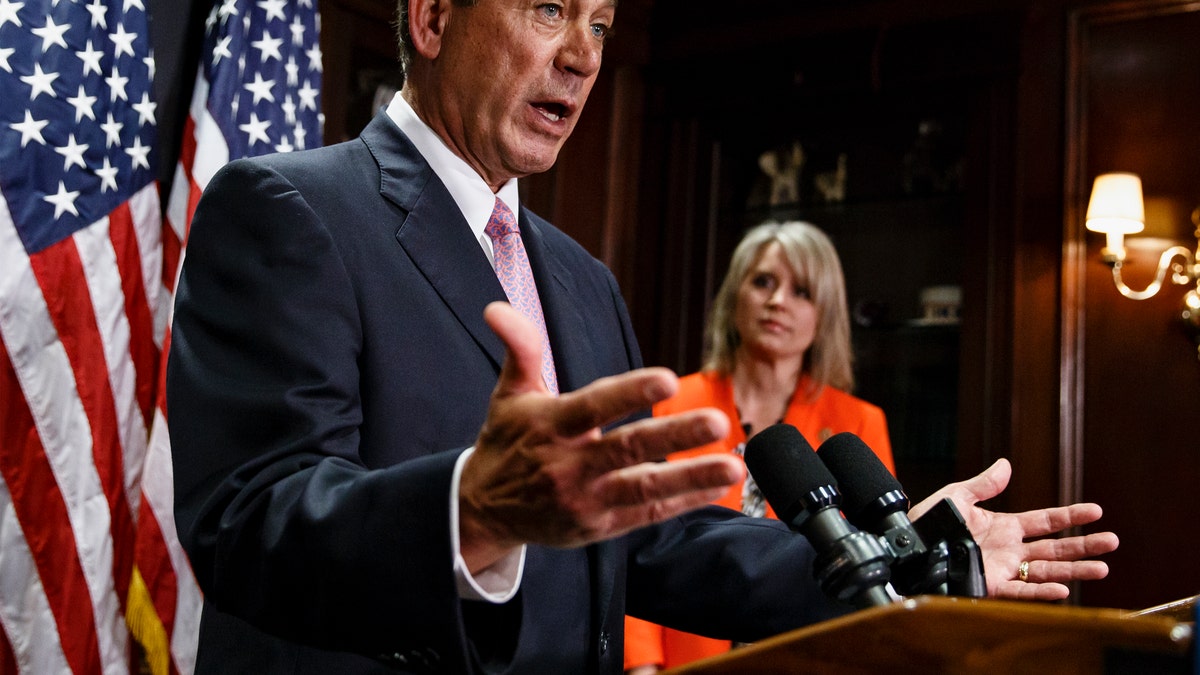
April 29, 2014: House Speaker John Boehner of Ohio, joined by Rep. Renee Ellmers, R-N.C., talks to reporters following a Republican strategy meeting on Capitol Hill in Washington. (AP)
Tuesday’s Washington Post/ABC News poll will not be welcome news to a suffering Democrat party.
Figures show that by 53 to 39 percent margin, Americans want Republicans to control Congress.
The electorate thinks it’s more important to have the Republicans in charge, to serve as a check on the president’s policies, as opposed to have Democrats in charge to help support the president’s policies. This is a clear knock on President Obama, the Democrats’ agenda and their execution of the agenda.
[pullquote]
This result is almost identical to the results of the same question when it was asked in September 2010, two months before the GOP landslide.
This is a bad omen, to say the least.
President Obama’s approval rating took a dive. It’s now at 41 percent down from 46 percent through the first three months of 2014. And Wednesday’s WSJ/NBC News poll doesn’t offer much better news: the president’s approval rating there is at 44 percent.
Fifty-two percent disapprove of the job Obama is doing. And only 42 percent approve of his handling of the economy, 37 percent approve of how he is handling the implementation of the Affordable Care Act and 34 percent approve of his handling of the situation involving Ukraine and Russia.
In the WSJ/NBC News poll, the president’s handling of the situation Russia’s intervention in Ukraine slipped to 37 percent from 43 percent in March.
If these numbers hold up – and there’s no reason to think that they won’t as Obama’s approval rating is also going down in both recent Gallup and Economist/YouGov polls – the Democrats are facing an even greater challenge than they thought. We are now looking at an increased likelihood of the Democrats losing the Senate in November.
According to the New York Times/Kaiser Foundation, close races in four southern states could very well tip the Senate to the Republicans. The poll highlights the races in Arkansas, North Carolina, Kentucky and Louisiana – all states that President Obama lost in 2012 and where his disapproval ratings run as high as 60 percent.
At the outset, we must be realistic about West Virginia, Montana and South Dakota, which are most likely losses for the Democrats.
North Carolina is very much in play. Kay Hagan has the support of 42 percent of voters while the frontrunner for the Republican nomination, Thom Tillis, is at 40 percent. Hagan’s approval rating is at 44 percent – the same as her disapproval number.
Mark Pryor currently holds a 10-point lead in Arkansas and has a 47-38 approval rating, but tanking Democrat numbers are bound to tighten up his race. The same is true of Mary Landrieu’s race in Louisiana where she has an early lead, but has faced tremendous criticism over ObamaCare and has already been hard at work distancing herself from the president’s agenda.
Despite this bleak picture, there are still two things that work to the Democrats’ advantage.
The first is that McConnell is effectively tied with his Democratic challenger and has a 52 percent disapproval rating. That said, the Republican nature of the state still makes him a favorite especially considering how unpopular Obama is in the state (32 percent approval for the president).
And in Georgia, daughter of former Senator Sam Nunn and Democrat candidate Michelle Nunn is currently in a dead heat or ahead of every potential Republican opponent. A win for the former nonprofit CEO would be a real surprise in the conservative state, which hasn’t seen a Democratic senator in nearly 10 years, but it’s not impossible.
It follows that the depth of Obama’s problems are so substantial that we now must view the Republicans themselves, their infighting and partisan attitude as one of, if not the only, asset the president still has. Close to 70 percent of Americans disapprove of the job Republicans are doing in Congress according to the latest McClatchy-Marist poll.
The Republicans have no message and no strategy. And they’re running out of time to develop one that goes beyond just running against Obama.
Indeed, Republicans are turning on each other. Just a few days ago at the Middletown Rotary Club, House Speaker John Boehner mocked his own party for their intransigence when it comes to comprehensive immigration reform.
“Here’s the attitude: ‘Ohhhh, don’t make me do this. Ohhh, this is too hard’…We get elected to make choices. We get elected to solve problems and it’s remarkable to me how many of my colleagues just don’t want to,” Boehner said. He continued, “They’ll take the path of least resistance…I’ve had every brick and bat and arrow shot at me over this issue just because I wanted to deal with it. I didn’t say it was going to be easy.”
Speaker Boehner’s comments portray a deeply divided Republican party. And this is where the Democrats have the chance to eek it out in November.
There is an opportunity for the Democrats to run effectively on attacking the Republicans and not just on their message of fairness and redistribution. They can paint the Republicans as hyper-partisan, divided and, thereby, bad for the country.
It isn’t exciting – or good politics for that matters – but it may just do the trick.
